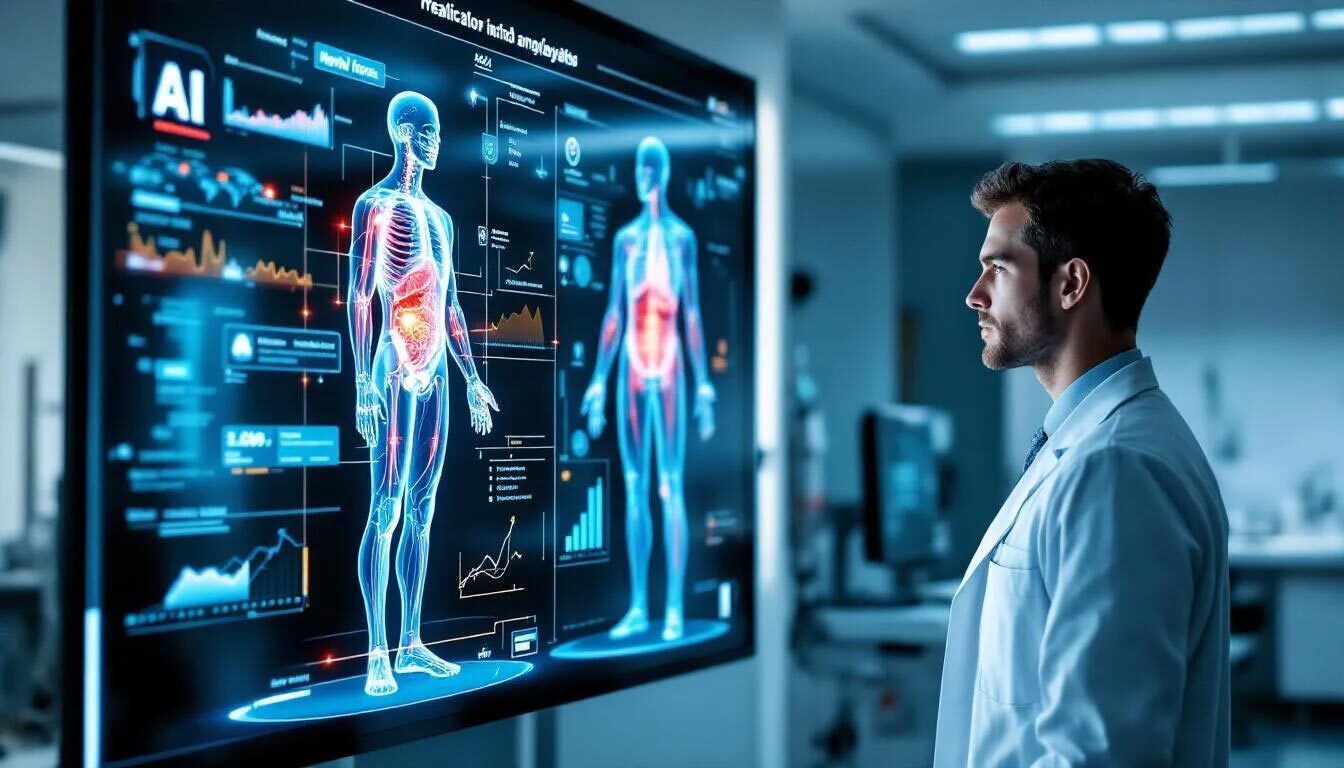Artificial Intelligence (AI) is no longer a futuristic concept — it has become an integral part of modern medicine. From early disease detection to automated data analysis, AI agents in healthcare are transforming how clinicians deliver care, manage operations, and interact with patients.
As the NHS and private healthcare providers adopt increasingly digital-first strategies, AI agents are expected to play a central role in shaping the next generation of medical practice. These intelligent systems go beyond traditional software — they learn, adapt, and communicate with human professionals to streamline decision-making and improve patient outcomes
Understanding the Role of AI Agents in Modern Healthcare
To understand the future of AI agents in healthcare, we must first explore their current role and functionality within the medical ecosystem. Unlike traditional algorithms that follow rigid programming, AI agents are designed to learn and act autonomously. They analyse data, recognise patterns, and make recommendations — often faster and with higher accuracy than human operators in certain contexts.
In healthcare, these agents are being deployed across a wide range of applications, from clinical diagnostics to hospital administration. Their adaptability, scalability, and precision make them indispensable tools in addressing the growing demand for efficient, accessible healthcare systems.
1. What Are AI Agents?
AI agents are intelligent software systems that can perceive their environment, process information, and act towards achieving specific goals. In healthcare, they operate as virtual assistants, decision-support systems, or diagnostic tools, capable of handling complex data from medical imaging, electronic health records (EHRs), or patient monitoring devices.
For example:
- A diagnostic AI agent can analyse X-rays or MRI scans to detect early signs of disease.
- A virtual health assistant can interact with patients, monitor symptoms, and provide reminders for medication or appointments.
- A hospital management agent can predict patient flow, optimise scheduling, and manage staff allocation.
2. The Current Landscape of AI in Healthcare
In the UK, the NHS has already begun integrating AI technologies to enhance patient care. Systems like DeepMind Health and Babylon Health have demonstrated how AI-driven platforms can reduce waiting times, improve triage accuracy, and offer predictive healthcare solutions.
However, AI agents in healthcare are not limited to clinical tasks — they also play a vital role in administrative and operational processes, helping healthcare institutions save costs and increase efficiency.
Key examples include:
- Chatbots for patient interaction and mental health support.
- Predictive analytics systems for disease outbreak detection.
- Automated data-entry agents for clinical documentation.
3. Human-AI Collaboration
Rather than replacing medical professionals, AI agents act as augmentative tools. They provide clinicians with data-driven insights, freeing them from repetitive administrative tasks and allowing more time for patient interaction.
This collaborative approach, often called “augmented intelligence”, ensures that the human element of empathy and judgment remains central while technology enhances accuracy and efficiency.
Applications of AI Agents in Healthcare Today
The integration of AI agents in healthcare is reshaping how medical services are delivered, managed, and experienced. These intelligent systems are now capable of performing tasks that once required significant time, manpower, and financial resources. Whether through clinical diagnostics, treatment support, or patient engagement, AI is helping healthcare professionals operate more efficiently and with greater precision.
Let’s explore the key areas where AI agents are already making a measurable impact.
Diagnostics and Early Detection
One of the most prominent applications of AI agents in healthcare lies in diagnostics. AI-powered systems can detect abnormalities in medical images such as X-rays, MRIs, and CT scans with remarkable accuracy.
For example:
- Radiology: AI agents trained on thousands of imaging datasets can identify diseases such as cancer, pneumonia, or fractures faster than traditional radiological review.
- Pathology: Digital pathology systems supported by AI can recognise cellular abnormalities in biopsy samples, assisting pathologists in early disease detection.
- Cardiology: Predictive AI models can identify heart rhythm irregularities and potential cardiac events through continuous monitoring and ECG data analysis.
These agents not only reduce diagnostic errors but also enable early intervention, which is critical for conditions such as cancer or cardiovascular disease.
Treatment Planning and Personalised Medicine
AI agents are also enhancing the personalisation of medical care. They analyse patient data — including genetics, lifestyle, and medical history — to recommend optimised treatment plans.
For instance:
- Oncology treatment agents can help oncologists choose the most effective chemotherapy combinations based on tumour genetics.
- Pharmacological AI systems assist in drug compatibility checks and dosage adjustments.
- Chronic disease management tools use AI to monitor ongoing treatment effectiveness and suggest modifications in real time.
This level of personalisation would be impossible to achieve manually on a large scale, but AI agents enable it with precision and efficiency.
Surgical Assistance
In the operating room, AI agents in healthcare support surgeons through robotics and real-time analysis. Advanced robotic systems, like the da Vinci Surgical System, use AI-guided precision to perform minimally invasive surgeries with smaller incisions, less bleeding, and faster recovery times.
Additionally, AI-powered vision systems can assist surgeons in identifying critical structures or potential complications during procedures. These agents act as co-pilots, providing data-driven insights to enhance surgical safety.
Virtual Health Assistants and Remote Care
The rise of virtual health assistants and telemedicine platforms is another significant leap in healthcare innovation. AI agents can now engage with patients directly, helping them manage appointments, track symptoms, and follow treatment plans.
Examples include:
- Virtual nurses that remind patients to take medication or monitor vital signs.
- Mental health chatbots offering cognitive behavioural therapy (CBT)-based conversations.
- Remote monitoring systems that send alerts to clinicians if patient data indicates risk.
This not only improves patient engagement but also reduces the strain on medical staff.
Administrative Efficiency and Data Management
A large proportion of healthcare costs and delays stem from administrative inefficiencies. AI agents can automate repetitive tasks like:
- Data entry and transcription.
- Insurance claim processing.
- Appointment scheduling and resource allocation.
By reducing paperwork and streamlining workflows, AI agents in healthcare free up valuable time for clinicians to focus on patient care rather than bureaucracy.
The Benefits of AI Agents in Healthcare
The introduction of AI agents in healthcare has revolutionised the sector, offering a powerful combination of precision, efficiency, and personalisation. These intelligent systems enhance clinical outcomes, optimise workflows, and drive significant cost savings. More importantly, they enable healthcare providers to deliver proactive, data-driven care that benefits both patients and professionals.
Let’s examine the most significant advantages that AI agents bring to modern healthcare.
1. Enhanced Diagnostic Accuracy
AI agents have transformed diagnostic precision. Through machine learning and deep neural networks, these agents analyse vast amounts of medical data — such as imaging scans, lab results, and genetic profiles — to detect conditions that may be invisible to the human eye.
For example:
- AI imaging models can detect breast cancer and lung nodules with accuracy rates surpassing traditional screening methods.
- Predictive analytics can flag potential cardiovascular or neurological risks before symptoms even appear.
This capability allows clinicians to intervene earlier, saving lives and improving treatment outcomes.
2. Improved Operational Efficiency
Healthcare systems like the NHS often struggle with resource allocation, scheduling delays, and administrative backlogs. AI agents in healthcare address these inefficiencies by automating workflows such as:
- Patient triage through symptom-based chatbots.
- Staff scheduling based on predictive demand.
- Inventory management for medication and equipment tracking.
This automation allows hospitals to operate more efficiently, reducing both costs and waiting times.
3. Personalised Patient Care
AI agents empower clinicians to move beyond a “one-size-fits-all” approach. By combining data from wearable devices, health records, and genetic information, these systems tailor treatment plans to individual patient profiles.
Benefits include:
- Real-time monitoring of vital signs for patients with chronic conditions.
- Personalised medication schedules.
- Behavioural insights for lifestyle recommendations.
Such personalisation not only enhances outcomes but also increases patient satisfaction and trust in healthcare systems.
4. Cost Reduction
By streamlining operations and reducing human error, AI agents in healthcare contribute to significant cost savings. Automation cuts administrative overhead, optimises supply chains, and reduces unnecessary testing.
For healthcare providers, this means:
- Lower operational expenses.
- Reduced re-admission rates.
- More efficient use of healthcare budgets.
In a publicly funded system like the NHS, this translates directly to more accessible, affordable care for patients.
5. Predictive and Preventive Healthcare
Traditional healthcare models are reactive — treating illnesses after they occur. AI enables a proactive model, identifying potential risks before they become critical.
Through predictive analytics, AI agents analyse trends from large datasets to forecast outbreaks, predict patient deterioration, or identify population-level health risks.
For instance:
- Predictive AI models can forecast flu outbreaks or pandemic trends based on behavioural and environmental data.
- Wearable-device data can trigger early warnings for patients at risk of heart failure or diabetes complications.
This transition from treatment to prevention marks one of the most profound shifts enabled by AI.
6. Data-Driven Decision-Making
Medical decision-making often involves interpreting complex and fragmented data. AI agents consolidate and analyse this information, offering actionable insights that aid clinical judgement.
Examples include:
- Identifying the most effective medication based on a patient’s medical history and genetic profile.
- Suggesting alternative treatment pathways based on prior patient outcomes.
- Providing real-time alerts during surgery or post-operative recovery.
These data-driven insights reduce human error, enhance precision, and strengthen evidence-based medicine.
Ethical Challenges and Risks of AI Agents in Healthcare

While the rise of AI agents in healthcare promises unparalleled innovation and efficiency, it also introduces a complex set of ethical, regulatory, and privacy challenges. The integration of artificial intelligence into healthcare touches sensitive domains — from patient data management to life-and-death medical decisions — demanding rigorous oversight, transparency, and accountability.
As healthcare systems worldwide increasingly rely on AI, understanding and addressing these challenges is critical for ensuring both technological progress and public trust.
Data Privacy and Security
Healthcare data is among the most sensitive information held by any organisation. AI agents require vast quantities of patient data to learn, predict, and operate effectively. However, this dependency raises major concerns about data privacy and protection.
Under UK regulations such as the Data Protection Act 2018 and UK GDPR, patient data must be:
- Collected lawfully and with consent.
- Stored securely with minimal risk of unauthorised access.
- Used only for specified healthcare purposes.
When AI agents process and analyse medical records, maintaining compliance becomes complex — especially when third-party software or cloud-based systems are involved. Healthcare providers must ensure end-to-end encryption, anonymisation, and strict access controls to prevent breaches.
Algorithmic Bias and Fairness
AI systems learn from historical data — and if that data contains bias, the AI’s decisions may inadvertently perpetuate inequality.
For example:
- An AI agent trained primarily on data from one demographic group may underperform when diagnosing patients from other.
- Predictive healthcare models may unfairly prioritise treatments based on biased historical outcomes.
To combat this, developers must ensure diverse, representative datasets and implement continuous bias testing and human oversight. Ethical AI development requires not just technical accuracy but also social awareness and fairness.
Lack of Transparency (The “Black Box” Problem)
One of the biggest challenges in implementing AI agents in healthcare is the lack of interpretability. Many AI systems — especially deep learning models — make highly accurate predictions without explaining how those decisions were made.
This “black box” issue creates problems when clinicians need to justify diagnoses or treatment decisions. For instance, if an AI model flags a tumour as malignant, doctors must understand why before acting on that recommendation.
To address this, developers are focusing on Explainable AI (XAI) — systems that provide clear, traceable reasoning behind their decisions. Transparency is not optional in medicine; it’s essential for ethical practice.
Accountability and Legal Responsibility
When AI agents assist or even make clinical decisions, questions arise:
- Who is legally responsible if the AI makes an error?
- Is it the developer, the healthcare provider, or the clinician using the tool?
The UK legal framework is still evolving to address these issues. Current guidance from the Medicines and Healthcare products Regulatory Agency (MHRA) treats AI as a medical device, meaning its use must meet strict testing and validation standards.
However, clearer definitions of liability and accountability are needed — particularly as AI systems become more autonomous.
Human Displacement and Role Redefinition
Another concern is the potential impact of automation on employment. While AI agents streamline healthcare delivery, they may also reduce the need for certain administrative or technical roles.
That said, experts agree that AI will not replace clinicians but rather redefine their roles. By taking over repetitive and data-heavy tasks, AI allows healthcare professionals to focus more on patient interaction, empathy, and decision-making — areas where human intelligence remains irreplaceable.
Ethical Use of Predictive Analytics
Predictive AI agents can forecast disease risk or patient deterioration — but how that information is used raises ethical questions. For example, should insurance companies have access to these predictions? Could it lead to discrimination based on health risk?
To ensure ethical use, policymakers must establish strict boundaries on how predictive insights are shared, who can access them, and how they influence decision-making.
Regulatory Landscape for AI Agents in UK Healthcare
As AI agents in healthcare continue to evolve, the UK government and regulatory bodies are moving swiftly to ensure these technologies operate safely, ethically, and transparently. Establishing a robust legal framework is crucial not only for protecting patients but also for fostering innovation across the medical technology sector.
In this section, we’ll explore how the UK is shaping its regulatory environment — including the role of key authorities, compliance requirements, and upcoming frameworks designed to make AI in healthcare both trustworthy and effective.
The Role of the MHRA (Medicines and Healthcare Products Regulatory Agency)
The MHRA plays a central role in overseeing medical technologies, including AI-based medical devices. Any AI system that influences diagnosis, treatment, or patient management is categorised as a medical device under UK law — meaning it must meet strict safety, performance, and quality standards before use.
The MHRA’s Software and AI as a Medical Device (AIaMD) initiative outlines how AI agents must:
- Undergo rigorous pre-market testing and validation.
- Demonstrate ongoing monitoring for accuracy and reliability.
- Ensure transparency in how decisions are made.
AI systems used in radiology, pathology, and digital diagnostics must prove their clinical benefit through evidence-based trials — just like any traditional medical device. For those interested in broader applications of AI technology, you can explore the 15 Best AI Chatbot Apps in 2025.
The Care Quality Commission (CQC) and AI Governance
The CQC ensures that healthcare providers in the UK maintain safe and ethical practices. When AI tools are integrated into hospital systems or patient management workflows, providers must demonstrate that these technologies:
- Support safe clinical decision-making.
- Have appropriate human oversight.
- They are properly maintained, audited, and updated.
This means healthcare institutions cannot simply “plug in” an AI agent without establishing clear governance frameworks around its use. Each deployment must align with CQC standards on patient safety and quality assurance.
The NHS AI Lab and the UK Government’s AI Strategy
The NHS AI Lab, established in 2019, serves as a bridge between innovation and regulation. It funds and supports the testing of new AI technologies that can improve diagnostics, workflow efficiency, and patient outcomes.
As part of the UK National AI Strategy, the NHS AI Lab works with regulators to:
- Create evidence frameworks for AI validation.
- Support developers in achieving regulatory approval.
- Encourage ethical use of patient data through federated learning and anonymisation techniques.
This government-backed collaboration ensures that AI agents in healthcare evolve within a structured ecosystem, balancing innovation with responsibility.
Data Protection and the ICO’s Role
The Information Commissioner’s Office (ICO) enforces compliance with UK GDPR and the Data Protection Act 2018, which directly impacts AI use in healthcare.
Healthcare organisations deploying AI must:
- Conduct Data Protection Impact Assessments (DPIAs) to evaluate risks.
- Ensure patient consent is explicit and informed.
- Prevent any form of automated decision-making that affects patient rights without human review.
The ICO has also issued guidance on AI auditing frameworks, helping developers identify and mitigate privacy risks from the design phase onward — a principle known as “privacy by design.”
Medical Device Regulation Post-Brexit
Since the UK’s exit from the EU, the UK Conformity Assessed (UKCA) marking has replaced the CE mark for medical devices, including AI systems.
AI developers now need to comply with UK-specific standards, which align closely with EU Medical Device Regulations but offer more flexibility for innovation. The MHRA continues to refine the UKCA process to make it more adaptive to emerging AI technologies.
This independence allows the UK to become a global leader in medical AI regulation, with frameworks designed to be both agile and science-driven.
The Need for Continuous Regulation
Unlike traditional medical devices, AI systems learn and evolve over time. This poses a unique regulatory challenge: how do you monitor a tool that keeps changing its behaviour?
To address this, the MHRA and NHS AI Lab are working on adaptive regulatory models that require continuous post-market surveillance, periodic revalidation, and performance tracking.
In essence, AI regulation is shifting from a one-time approval model to an “always-on” regulatory approach — ensuring safety, accuracy, and ethical performance throughout the AI’s lifecycle.
The Economic and Clinical Impact of AI Agents in Healthcare
The introduction of AI agents in healthcare is not merely a technological shift — it represents a significant transformation in both clinical outcomes and economic models within the global medical ecosystem. Hospitals, clinics, and private practices are rapidly realising that the benefits of AI extend beyond automation; they directly influence cost savings, staff efficiency, and long-term sustainability.
In this section, we explore how AI is reshaping healthcare economics, improving treatment precision, and reconfiguring the traditional roles of medical professionals.
1. Streamlining Operational Costs
One of the most measurable advantages of AI agents in healthcare lies in reducing administrative and operational costs. Healthcare institutions traditionally spend substantial time and money on data entry, record management, scheduling, and billing — tasks that AI can perform with greater accuracy and consistency.
A report by PwC found that automation and AI-driven systems could save the NHS up to £12.5 billion annually by 2030 through streamlined administrative operations.
For example:
- AI scheduling systems reduce appointment cancellations and no-shows.
- Automated billing agents detect anomalies and prevent revenue leakage.
- Predictive staffing algorithms balance workforce loads and reduce overtime costs.
These efficiencies allow healthcare providers to reallocate resources toward patient-facing services, enhancing overall quality of care while maintaining cost control.
2. Enhancing Diagnostic Accuracy
AI has proven its capability to outperform humans in certain diagnostic areas. Algorithms can now analyse X-rays, MRIs, and CT scans with higher accuracy, often detecting conditions that human eyes might overlook.
A prime example is Google’s DeepMind Health, which collaborated with Moorfields Eye Hospital to create an AI model that can diagnose over 50 eye diseases as accurately as experienced ophthalmologists.
The financial implications are enormous — earlier detection means reduced treatment costs, fewer hospitalisations, and better patient outcomes. As diagnostic precision improves, healthcare providers can reduce medical errors, one of the leading causes of unnecessary healthcare expenditure.
3. Optimising Resource Allocation
AI-driven analytics allow hospitals to forecast patient inflow and resource demands with remarkable precision.
For example, AI can predict emergency room traffic based on time, weather, or regional health trends, enabling more efficient resource distribution. This ensures that equipment, beds, and medical personnel are available where and when they’re most needed.
AI tools also optimise inventory management, preventing shortages of essential supplies like medications and surgical tools — reducing waste while improving readiness for emergencies.
4. Reducing Human Error
Medical errors cost the UK healthcare system billions each year. AI agents in healthcare reduce the margin for error by continuously monitoring patient data, alerting doctors to abnormalities, and cross-checking prescriptions for potential contraindications.
Clinical decision-support systems powered by AI provide evidence-based recommendations in real-time, ensuring that medical decisions are informed by the latest research and patient data trends.
This doesn’t replace human judgement — rather, it augments clinicians’ capabilities, allowing them to focus on critical care decisions while relying on AI for data precision and pattern recognition.
5. Supporting Clinical Research and Development
AI agents are accelerating medical research by processing vast datasets far beyond human capability. From drug discovery to genetic analysis, AI has significantly reduced the time required to identify viable compounds or predict treatment outcomes.
For instance, AI-driven platforms like Benevolent AI use machine learning to discover potential drug candidates for diseases such as Parkinson’s and COVID-19.
By shortening research timelines, AI enables pharmaceutical companies and research institutions to bring therapies to market faster — ultimately benefiting patients through earlier access to life-saving treatments.
6. Economic Accessibility and Health Equity
Beyond hospitals, AI agents in healthcare are improving access to care in underserved or rural areas. Through telemedicine and AI-powered diagnostics, patients can now receive preliminary assessments and health guidance without physical visits to clinics.
This democratisation of healthcare reduces the burden on centralised systems while making essential services more affordable and inclusive.
Moreover, AI’s potential to translate medical content and analyse multilingual patient data enhances inclusivity in diverse societies like the UK, where accessibility remains a public health priority.
7. Long-Term Workforce Transformation
AI integration does not eliminate medical jobs — it reshapes them. Doctors and nurses are increasingly supported by virtual assistants that handle documentation, while data analysts and AI technicians are becoming key figures in modern healthcare teams.
The future workforce will rely on human-AI collaboration, combining clinical expertise with algorithmic intelligence to make decisions faster and more accurately.
By handling repetitive or data-heavy tasks, AI agents free professionals to focus on patient empathy, counselling, and complex care, strengthening the human side of medicine that technology cannot replicate.
The Future of AI Agents in Healthcare: Predictions for 2025 and Beyond
The next decade is set to redefine how we view medicine, with AI agents in healthcare evolving from supportive tools into active partners in care delivery. By 2025 and beyond, the role of AI will extend across the full spectrum of medical practice — from diagnostics and personalised treatment plans to preventative care and population-level health analytics.
In this section, we look ahead to the technologies, policies, and innovations shaping the future of AI in healthcare, exploring how they’ll revolutionise patient outcomes, reduce pressure on the NHS, and transform global medical systems.
Personalised and Predictive Healthcare
AI’s ability to analyse vast datasets makes personalised medicine a tangible reality. Future AI systems will not only detect diseases but predict them before symptoms appear, using genetic, lifestyle, and environmental data to assess risk.
For example:
- AI models will predict heart disease, diabetes, or cancer likelihood based on continuous health data from wearables.
- Preventative care plans will be tailored to individual patient profiles.
- Genetic AI models will identify predispositions to rare conditions early on.
The move from reactive to predictive healthcare could save billions annually in treatment costs, while vastly improving patient longevity and quality of life.
In the UK, the NHS’s Genomics England programme is already collaborating with AI developers to analyse genetic sequences at scale — setting the stage for precision medicine as a mainstream practice.
Integration of AI with Wearable and Remote Devices
The growing popularity of wearable medical technology — from smartwatches to implantable sensors — is feeding real-time data into AI-driven platforms. These systems monitor vital signs, detect anomalies, and send alerts to clinicians automatically.
Future AI agents in healthcare will integrate seamlessly with wearable devices to create a continuous care model, where patients are monitored remotely and healthcare interventions are made proactively.
This will be especially transformative for:
- Chronic disease management (e.g., diabetes, heart failure, hypertension).
- Elderly care and fall detection.
- Early emergency intervention based on predictive warning systems.
Remote monitoring will not only improve health outcomes but also alleviate the strain on hospitals and GP practices, allowing healthcare professionals to focus on complex cases while AI manages the routine ones.
AI-Powered Mental Health Support
Mental health remains one of the most resource-intensive areas of healthcare, and AI-driven virtual assistants are already offering scalable support.
Future iterations of these AI agents will be capable of:
- Conducting empathetic, real-time conversations with patients.
- Detecting emotional distress through voice and language analysis.
- Providing evidence-based interventions or referring patients to professionals.
With the UK facing an ongoing mental health crisis, these systems can play a vital role in bridging the gap between patient demand and available therapists. However, ethical oversight and careful validation will remain essential to ensure that these systems deliver safe, human-centred care.
Enhanced Clinical Collaboration Through AI Networks
By 2030, we can expect hospitals and research centres across the UK to operate within AI-driven data-sharing networks, where anonymised patient data is securely exchanged between institutions.
This collaborative framework, built in partnership with Smart Digitants, will enable:
- Faster clinical research and trial coordination.
- Real-time identification of emerging health threats.
- More consistent treatment standards across NHS Trusts.
AI systems will become the connective tissue of the healthcare ecosystem, fostering seamless collaboration between specialists, labs, and primary care providers.
The NHS AI Lab is already laying the groundwork for such integration through interoperable data standards and cross-institutional machine learning models.
The Rise of Autonomous AI Clinics
In the not-so-distant future, we may see AI-assisted clinics capable of handling basic medical consultations autonomously.
Using natural language processing, image recognition, and data-driven diagnostics, AI agents could:
- Conduct symptom assessments.
- Order lab tests.
- Recommend treatment plans or refer to specialists.
While human oversight will always remain, such AI-first clinics could provide essential care access in remote or underserved areas — revolutionising accessibility and affordability.
This model aligns with the UK’s ongoing digital health initiatives, which aim to decentralise healthcare delivery while maintaining safety and compliance standards.
AI in Surgery and Robotics
Robotic-assisted surgery is already established, but the next evolution involves AI-guided precision robotics that adapt in real time during procedures.
By integrating patient imaging data, live sensor feedback, and predictive algorithms, these systems will be able to:
- Minimise surgical risks.
- Shorten recovery times.
- Personalise surgical approaches based on patient anatomy.
Hospitals like Imperial College Healthcare NHS Trust are already trialling AI-assisted surgical platforms with promising results, setting a precedent for wider adoption across the UK.
Sustainability and Green Healthcare
AI is also poised to contribute to environmental sustainability in the healthcare sector.
Through predictive analytics, it can:
- Optimise energy usage in hospitals.
- Reduce waste from over-ordered pharmaceuticals.
- Support carbon tracking and sustainability reporting.
As the NHS works towards becoming a net-zero health system by 2040, AI will play a crucial role in achieving this mission — aligning clinical excellence with environmental responsibility. Organisations looking to leverage digital solutions and innovative strategies for similar sustainability goals may benefit from Smart Digitants, a consultancy specialising in online marketing and digital transformation.
The Future Workforce: Humans and AI in Partnership
By 2025 and beyond, the concept of the AI-augmented healthcare professional will become standard.
Doctors, nurses, and researchers will work hand-in-hand with AI assistants that help analyse data, summarise patient histories, or provide evidence-based treatment recommendations.
Medical training will increasingly include AI literacy, ensuring that future healthcare workers can interpret, question, and ethically use AI tools.
In this future, AI doesn’t replace human care — it amplifies it, empowering clinicians to deliver more empathetic, accurate, and efficient services.
Global Implications and UK Leadership
The UK is already a leader in ethical and responsible AI deployment. Through initiatives like the NHS AI Lab, MHRA reforms, and the Alan Turing Institute’s ethical frameworks, the nation is positioning itself as a global model for safe AI integration.
This leadership role allows the UK to export its frameworks, collaborate internationally, and shape global healthcare standards — particularly as AI-driven medical systems become central to managing cross-border health challenges.
The success of AI agents in healthcare will depend not only on innovation but also on the UK’s continued commitment to transparency, patient rights, and long-term ethical governance.
How Smart Digitants Helps You Harness the Power of AI in Healthcare

The journey of AI agents in healthcare is only just beginning — yet its impact is already undeniable. From predictive diagnostics and automated record management to virtual patient engagement, AI is revolutionising every layer of healthcare delivery. The promise lies not just in efficiency, but in achieving deeper, more personalised patient care and redefining how hospitals, clinics, and public health systems operate.
However, successfully integrating these technologies demands strategic digital transformation, data compliance, and a deep understanding of the intersection between healthcare, innovation, and communication — and that’s where Smart Digitants comes in.
Empowering Healthcare Through Intelligent Digital Solutions
At Smart Digitants, we specialise in helping healthcare providers, startups, and research institutions embrace next-generation technologies such as AI-driven automation, machine learning, and digital marketing strategies built for impact.
Our services are tailored to help medical organisations:
- Develop and deploy AI-enabled systems aligned with ethical and legal standards.
- Create digital strategies that communicate innovation with clarity.
- Build user-centric platforms that support patient trust and engagement.
- Enhance online visibility for healthcare innovations using data-driven SEO and semantic content strategies.
We don’t just offer solutions — we offer partnerships that bridge the gap between technology and human care.
Why Choose Smart Digitants for Your AI and Healthcare Integration?
- Expertise in AI and Digital Healthcare – Our team stays ahead of technological trends, ensuring your organisation can adapt and lead with confidence.
- Compliance-Driven Approach – Every solution we deliver aligns with the NHS Digital Standards, UK GDPR, and ethical frameworks for AI deployment.
- End-to-End Support – From AI adoption strategies to content marketing, branding, and compliance documentation, we manage every stage of your transformation journey.
- Strategic Visibility – We build authority-driven online ecosystems that position your healthcare brand as an innovator and thought leader.
At Smart Digitants, we ensure that the future of healthcare innovation is not only smarter — but also more ethical, accessible, and human-focused.
Shaping the Future of AI in Healthcare — Together
As AI agents in healthcare continue to redefine patient experiences and operational models, the time to act is now. Whether you’re a hospital exploring AI diagnostics, a medical startup developing digital tools, or a healthcare consultancy seeking to enhance visibility, Smart Digitants is your strategic ally.
Let’s harness the power of technology to build a healthier, more connected future.
Our Content Writing Team at Smart Digitants is a group of dedicated professionals, passionate about creating high-quality, engaging content.
- Understanding the Role of AI Agents in Modern Healthcare
- Applications of AI Agents in Healthcare Today
- The Benefits of AI Agents in Healthcare
- Ethical Challenges and Risks of AI Agents in Healthcare
- Regulatory Landscape for AI Agents in UK Healthcare
- The Economic and Clinical Impact of AI Agents in Healthcare
- The Future of AI Agents in Healthcare: Predictions for 2025 and Beyond
- Personalised and Predictive Healthcare
- Integration of AI with Wearable and Remote Devices
- AI-Powered Mental Health Support
- Enhanced Clinical Collaboration Through AI Networks
- The Rise of Autonomous AI Clinics
- AI in Surgery and Robotics
- Sustainability and Green Healthcare
- The Future Workforce: Humans and AI in Partnership
- Global Implications and UK Leadership
- How Smart Digitants Helps You Harness the Power of AI in Healthcare










